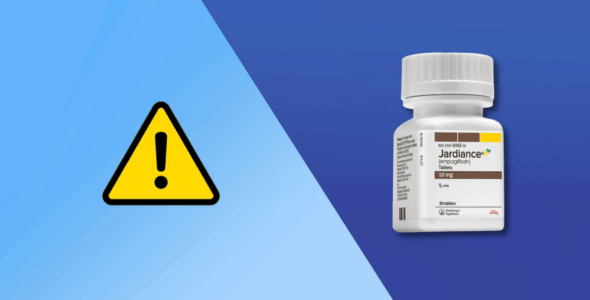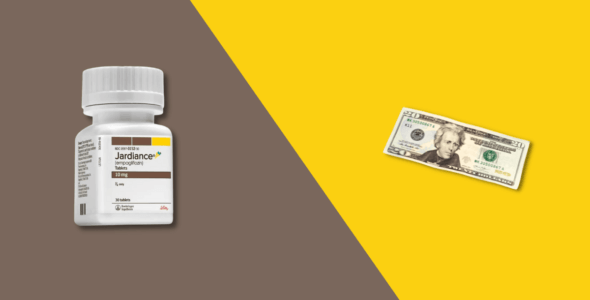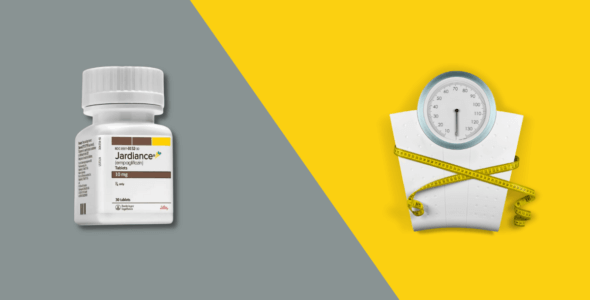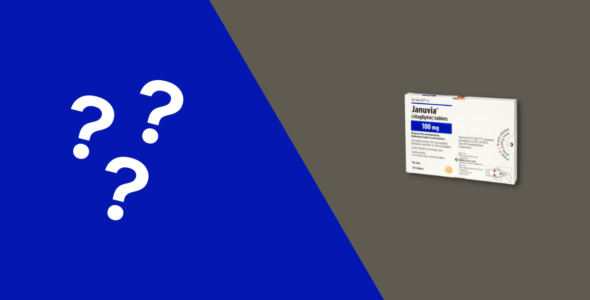Jardiance and Januvia are brand-name prescription drugs used in diabetes treatment to control blood sugar (blood glucose) in type 2 diabetes. These drugs do not treat type 1 diabetes. Both drugs are FDA approved and are included in the American Diabetes Association guidelines.
Jardiance and Januvia are usually prescribed if metformin is not working well. These diabetes drugs belong to different drug classes: Jardiance is a sodium glucose co-transporter-2 inhibitor (SGLT-2 inhibitor) and Januvia is a dipeptidyl peptidase 4 inhibitor (DPP-4 inhibitor) therefore they work in different ways. Jardiance is approved for three indications whereas Januvia is approved for only one. Read on to find more about the differences and similarities between them both.
What is Jardiance?
Jardiance is a medicine prescribed to adults with type 2 diabetes. It’s used to
- Reduce blood sugar levels (when used alongside exercise and diet changes)
- Reduce the risk of cardiovascular death in adults with type 2 diabetes and heart disease
- Reduce the risk of cardiovascular death or hospitalization for heart failure in adults with heart failure and reduced ejection fraction
Jardiance can help you lower your blood sugar levels when taken alongside dietary and lifestyle changes. It causes you to excrete more sugar in your urine than you would normally. This lowers your blood sugar and helps to reduce your risk of health conditions like cardiovascular disease. Jardiance comes as a tablet you swallow with water.
Jardiance active ingredients
The active ingredient in Jardiance is called empagliflozin. It lowers your blood sugar levels by causing you to lose more sugar in your urine than you usually would.
Your kidneys help recycle sugar back into your blood from your urine, with the help of a protein called SGLT-2. Empagliflozin is an inhibitor of this protein, reducing how much sugar your kidneys recycle. This makes you lose more sugar in your urine, rather than it being excreted back into your blood.
Side effects of Jardiance
As is the case with most medications, Jardiance can cause side effects. You might not experience any, but the most common possible side effects can include:
- Genital yeast infections (thrush) in both men and women
- Needing to urinate more often and urinating more than usual
- Feeling more thirsty than usual
- Joint pain
- Weight loss
- An increase in cholesterol levels
In rare instances, Jardiance can cause more serious side effects, including:
- Severe allergic reactions to the medication
- A rare but serious bacterial infection that damages tissue under the skin (necrotizing fasciitis) in the area between the anus and genitals (perineum)
- Diabetic ketoacidosis, a potentially life-threatening condition where your body breaks down too much fat too quickly, causing you to produce high levels of blood acids called ketones
- Hypoglycemia – your blood sugar falling too low – particularly when used with other medications like insulin or sulfonylurea
- An increased risk of serious urinary tract infections
- A high and potentially harmful increase in your cholesterol levels
- Dehydration
- Low blood pressure
Jardiance drug interactions
Jardiance can also interact with other medications, which can limit its effectiveness, including:
- Any other diabetes medications, like insulin or sulfonylureas
- Other medications that can lower your blood sugar levels, like diuretics, corticosteroids, estrogens, oral contraceptives, nicotinic acid, and calcium channel blocking drugs
Jardiance warnings & precautions
Don’t take Jardiance if you:
- Are allergic to the active ingredient empagliflozin
- Are allergic to any of the other ingredients in Jardiance
- Have type 1 diabetes
- Are under 18 years of age
Talk to your doctor before taking Jardiance if you:
- Have any liver or kidney problems
- Have or have ever had problems with your pancreas, like pancreatitis or surgery on your pancreas
- Have a history of urinary tract infections or any problems with urination
- Often drink alcohol, or drink a lot of alcohol in a short period of time (“binge” drinking)
- Are going to have surgery in the near future
- Are eating less than usual or have changed your diet
- Are pregnant or are planning to become pregnant
- Are breastfeeding or are planning to breastfeed
What is Januvia?
Januvia is a prescription medicine used to:
- Treat type 2 diabetes, by helping to lower blood sugar levels when used in combination with exercise and changes to your diet
Januvia is taken as a pill that’s swallowed, usually once a day in the following doses: 25 mg, 50 mg, and 100 mg.
If you have type 2 diabetes, your body may not produce enough insulin or may become resistant to the effects of insulin. This means less sugar is removed from your blood and your blood sugar levels stay too high. High blood sugar levels can cause a range of problems over time, including nerve damage, heart disease, strokes, and kidney failure.
Januvia treats type 2 diabetes by helping to lower your blood sugar levels. It encourages your pancreas to produce insulin for longer after you’ve eaten, helping your body absorb more sugar out of your blood.
Januvia active ingredients
The active ingredient in Januvia is called sitagliptin. It works by increasing the amount of insulin you produce after you’ve eaten.
When you digest food, your stomach and gut produce digestive hormones called GLP-1 and GIP. These hormones make your pancreas secrete insulin. As you continue to digest your food, the digestive hormones are broken down by an enzyme called DPP-4 to allow your levels of insulin to fall again.
Sitagliptin stops the DPP-4 enzyme from breaking down the digestive hormones. This keeps the hormones active for longer, making you produce more insulin, and lowering your blood sugar to normal levels.
Side effects of Januvia
The most common side effects caused by Januvia include
- Upper respiratory infections and the common cold
- Headaches
- Back pain
- Hypoglycemia (low blood sugar levels)
- Vomiting
- Constipation
In rarer cases, Januvia can cause more serious side effects like
- Inflammation of the pancreas (pancreatitis) that can be fatal in severe cases
- Severe allergic reactions to the medication that can cause anaphylaxis – a potentially life-threatening condition where your immune system overreacts, causing swelling in your face, mouth, and throat that can make it hard to breathe
- Kidney problems or kidney disease that can reduce kidney function or cause kidney failure in severe cases
- Joint pain that can become severe
- Dangerously low blood sugar levels (hypoglycemia)
If you take Januvia you could experience side effects, including the most serious, but everyone reacts differently to medication. If you have any concerns about side effects, talk to your physician or a pharmacist.
Januvia drug interactions
Certain medications can interact with each other, affecting how they work and making some side effects more likely. Medications that are known or thought to interact with Januvia include:
- Other medications that can lower blood sugar levels, like insulin or a sulfonylurea medicine
- Digoxin, used to treat a range of heart conditions
Januvia warnings & precautions
Don’t take Januvia if you:
- Are allergic to the active ingredient sitagliptin
- Are allergic to any of the other ingredients in Januvia (listed in the leaflet which comes with the medication)
- Have type 1 diabetes
- Are under 18 years of age
Talk to your doctor before taking Januvia if you:
- Have a history of pancreatitis (inflammation of the pancreas)
- Have a heart condition
- Have kidney disease
- Are over 65 years of age
Read the full prescribing information for Jardiance and Januvia and always speak with your healthcare provider for medical advice about your medicine so they can monitor and evaluate your condition. Always inform your healthcare provider of all medical conditions, medications taken including over the counter meds and supplements.



